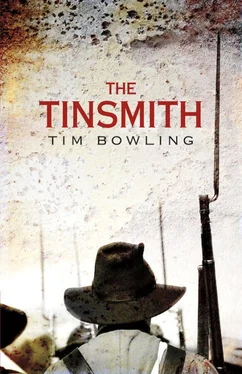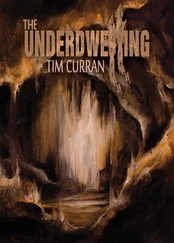“Jancey!” John’s heart banged against his ribs. He couldn’t speak.
Caleb smiled. “De overseer didn’t catch her. She’s clear away. In Canada.”
With a sickening sensation, John understood that Caleb’s mind had been damaged along with his body. The old man needed to keep one of his daughters alive in order to keep himself alive. That he chose Jancey only increased John’s own pain.
“She knows de truth about dat hog too,” Caleb said, reading his thoughts. “I figure she always did know. Inside. Probably her mother did too.”
He slumped against the dirt wall, ran his thick tongue over his cracked lips.
The mention of Daney struck John like cold water. He remembered where he was, and when. The overseer’s face crossed over Jancey’s just as if he’d come up from behind and wrapped his arms around her. John knew he couldn’t waste any more time.
“Orlett and Cray. Where are they, Caleb?”
But the old man just sighed and shook his head. Fortunately, one of the other blacks explained. Orlett and Cray did some kind of work for the Union army. There was money to be made from the war, he had heard Orlett say. Maybe they sold horses. They owned plenty of them, had been buying them up for months. Generally they returned to the house at nightfall, but on account of the battle, it was hard to know when they’d come back this time.
Carefully, and with much effort, John struck the irons with a mallet and chisel he’d brought from the barn and told the men he’d take them straight away to a Union camp. If they were too weak to walk, he’d carry them. He wanted to get them safely away before the overseer and the mulatto returned. Did they have any idea where the women were kept?
“Dey somewhere in de house,” Caleb said. “We could hear de screaming sometimes. Jes days ago. De overseer, he like us to know what he doin with dem.”
John told them to stay put until he came back. Then he ran upstairs. But a search of the other rooms revealed nothing. Finally he remembered the attic. Climbing the stairs to it, he did not think anyone was there, for the air was not so foul and there was no sound. But when he pulled his head through the hole in the floor, he saw the bodies, gagged and handcuffed with rope. The overseer must have kept the space clean because… he didn’t want to think of it. He spoke gently to the women, told them he was a friend who had brought freedom, that he would lead them away from this place. Urging them to be quiet, John undid the gags. Light fell in thin shafts through the ceiling cracks, and he saw that the six women were mostly young and very black. They just stared at the air as he undid their ropes, trying his best to be gentle even though he could feel the overseer’s foul warm breath on his neck. Whenever one of the thin cotton shifts slid away to reveal a breast or stomach, he paused. Once, he discreetly pulled the shift back up. The smell of the women’s bodies stirred him despite the situation, and he was ashamed. The women began to speak to each other in a foreign tongue and he urged them again to be quiet. Hurriedly he prepared to lead them downstairs, not knowing exactly what he should do with them or the men in the cellar. The Union army would not welcome any new contrabands now, not so soon after a horrific battle. And besides, he already knew that the slaveholders of Maryland were to be respected, given that the state remained neutral. Perhaps he could find the home of a free black on the other side of the village. Caleb would know what was best.
John told the women to wait for him, then he rushed back down to the cellar. The men had already begun to stir; several had gone through the broken door into the cellar itself. But Caleb had not moved. John bent over him, urged him to stand. Caleb shook his head.
“Dey’s no hurry for me. I knowed the truth long ago. I could feel it happen.”
“What truth?”
“Doan lie to me, son. I know dey gone. All of dem gone ’cept… I could always tell when something bad happen fo us. I’d have been dead since dat time if word hadn’t come down de underground about Jancey. Listen, now, you take dese people as far away as you can, dat’s what you got to do.”
“But Orlett. I want to…”
“If dat’s goin to be, den it will come. But you get dese people away.”
And Caleb told of the house of a free black man south of the village, a man who’d been harbouring runaways since before the war and knew all about the underground railroad. That man would know best how to protect the blacks.
“But you can’t stay here,” he told Caleb. “When Orlett comes back and finds the others gone, he’ll kill you.”
Caleb’s face was blank; the tears had gone from his wrinkles.
“You think dey’s anything dose devils can do worse dan what’s been done. It’s too late for me. But you get dose people away and yourself too. Never mind de overseer. Dat evil jes keeps comin’ if you kill it.”
He ran a trembling hand across his lips and blinked slowly, as if his eyelids were made of iron.
“Dey’s always evil. You can’t kill it by killin’ one man. Den you be jes as bad. But you’re not a killer, John. Dat ain’t your way. You get dose people clear. Go on! I’ll get myself to my cabin. Dat overseer, he too busy now to bother about one old nigger. Go on now!”
So he gathered the men onto the main floor and explained that he would take them to safety. Running back to the attic, however, he found only four women; the other two had run off on their own. Now the sounds of the old house and the starting rain on the roof seemed to contain hoof beats and footfalls. He hastened to get the blacks outside.
The air still burned with the acrid chemical smoke of battle, but the rain brought a welcome freshness. John gulped several breaths down and surveyed the immediate area. No one appeared, so he set off, hoping for the one thing contrary to what he’d been focused on for so long: that Orlett would remain absent.
It took the rest of the day to reach the free black’s house and relieve himself of the responsibility for the men and women. His success strengthened his resolve; when he moved on, he was surprised to find how much his body had lightened.
Not until after midnight, however, did he reach the farm again, coming at it slowly. The house was dark and empty. Orlett had not returned. John moved on to Caleb’s cabin to take him what food he had managed to gather during the day’s travels. There had been bodies everywhere, the cries of wounded for water, wagons and men clustered around almost every building, which, he discovered, had been turned into hospitals. Soon, perhaps, this farm, too, would be used for a similar purpose.
He had not slept in a long while. The excitement of the morning’s battle and the tension of the aftermath suddenly weighed him down. He entered Caleb’s cabin heavily.
The old man was curled into himself in a corner, without even a covering blanket. John touched him gently on the shoulder, eager to tell him that he had succeeded in reaching the free black’s house. But when he turned him slightly, he knew that Caleb was dead. His eyes were half-closed, his face cold, but there was no mark of violence upon him save the whip marks scarred into his back.
John wrapped his arms around him and lay there on the bare floor. His tears flowed freely, but they were no relief. He felt them form the two letters on his cheek, and his cheek seemed to blaze, to become a beacon that the overseer could not fail to notice. But the cabin’s silence and his own great fatigue closed his eyes. Though there was no peace in the brief sleep he found pressed against Caleb’s cold body, he felt stronger when he woke. He lifted Caleb in his arms and carried him to the blacks’ graveyard and buried him, not even caring what attention he drew, hoping in fact that his grief would bring Orlett to him.
Читать дальше












